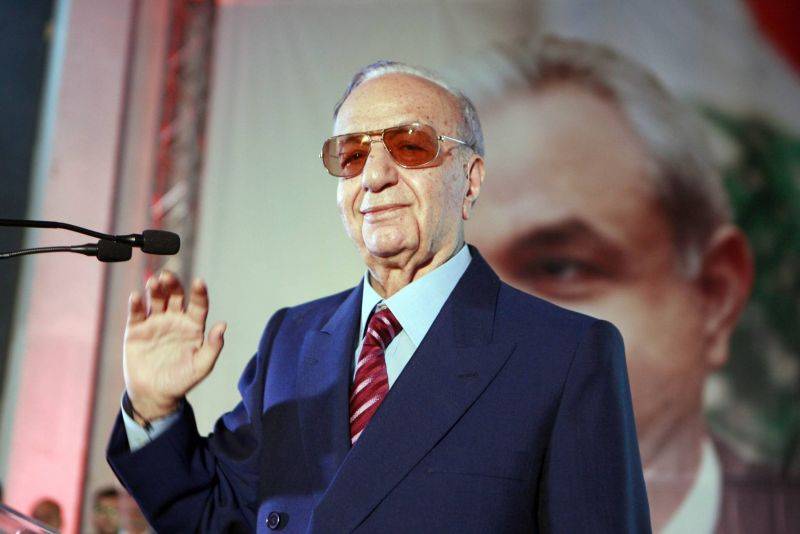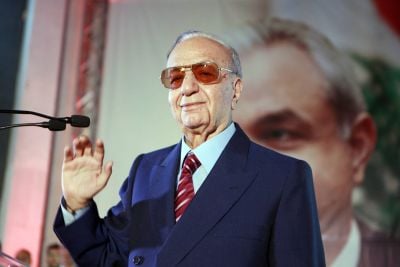
Michel Murr during the 2018 legislative elections. (Credit: Marwan Assaf)
Michel Murr was perhaps the man who best embodied the Lebanese way of doing politics — in both its good and bad aspects.
Seen as a symbol of large-scale patronage and clientelism, Michel Murr, who died Sunday as a result of COVID-19 complications at the age of 88, was extremely efficient in certain matters, be it positively or negatively.
He offered his partisans and voters reassuring proximity to, and served as a bridge with, the distant, shapeless and hostile entity that is the Lebanese state.
In his heyday, Murr ensconced himself in a giant tower, located in Amaret Chalhoub, north of Beirut, dubbed the “Amara,” which housed his offices and served as the headquarters for his electoral campaigns. This was where he managed his entire network of municipal counselors, mukhtars, scrutineers and other power brokers operating in his fiefdom of Metn.
Always a pragmatic statesman, he shifted alliances according to the circumstances, with total disregard to the battles of ideas or political stakes. He never upset the great equilibrium that governed the country.
Most importantly, throughout his zigzagging career, he had one cardinal rule: defend the presence and the political role of Christians in Lebanon.
His loyalty to this cause explains, for instance, how in the 1990s, at the height of his alliance with the Syrian regime during its hegemony over Lebanon — to the extent that he became, at times, one of its tools in the country — the Greek Orthodox politician of Metn never broke off his ties with Maronite Patriarch Nasrallah Sfeir. At the time, Sfeir embodied anti-Syrian Lebanese sovereignty.
Born in 1932 in Bteghrin, a town in the Metn District, this engineer and shrewd businessman was discovered during the 1960s by fellow Metn citizen, Pierre Gemayel, the founder and then-leader of the Kataeb party.
When Murr tried his luck in politics, he was elected MP for this district.
His career was launched: while remaining strictly independent, he would forge a long-term alliance with the Kataeb and the Armenian Tashnag, thus becoming the third pillar of a powerful electoral machine.
Murr witnessed his first setback in 1972. He was defeated in legislative elections by his adversary, the very popular doctor Albert Mukhaiber, who was close to Raymond Eddé’s Lebanese National Bloc. Murr was the only candidate on his list to lose, although he was its main sponsor.
The strong man
Three years later, the Civil War set in. Legislative elections were put on hold until 1992. This was the year when, with the war over, Damascus extended its control over almost the entire country. Murr broke from the boycott strategy vis-à-vis the Syrian regime adopted by Christian parties and staged a comeback.
He worked to forge an astounding electoral power that would raise him to the skies. The “Murr system” was born.
He prospered especially at the Interior Ministry, which he and his son would lead several times.
Murr also took up the post of deputy prime minister, a position which — although not clearly delineated — granted him no less of an aura of influence, making him one of the country’s strongmen, notably under the mandate of President Emile Lahoud, to whom he was related by marriage. Lahoud’s daughter was married to Murr’s son, Elias Murr. Later they divorced.
The Syrian withdrawal from Lebanon in 2005 brought the beginning of the descent for Murr. He was overtaken in his own stronghold by supporters of Gen. Michel Aoun, with whom he first allied.
Four years later during parliamentary elections he found himself facing the Aounists, who won six seats out of eight in the Metn district. The remaining two were secured by Murr and Sami Gemayel, the new leader of the Kataeb.
In 2018, the same story played out again. Murr was said to be finished, he had barely any resources and no allies. Yet, he managed one last time to thumb his nose at his opponents, notably the Aounists, and retained his seat in Parliament. But the “Murr system” was finished.
The ultimate irony is that with the passing of Murr, clientelism remains more than ever at the heart of relations between rulers and ruled in Lebanon.
This article was originally published in French in L'Orient-Le Jour. Translation by Sahar Ghoussoub.
